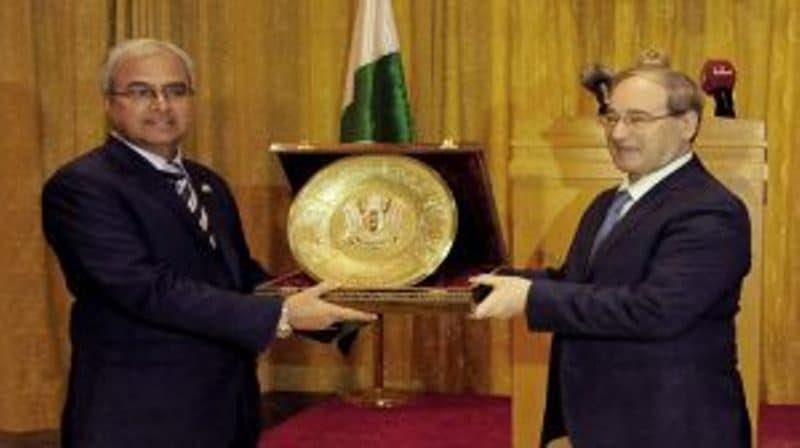How a 37-year path led to Pakistan’s “neutral” position on the Assad regime’s campaign v. Syria’s civilians
Naveed Ahmad writes, in an article adapted from the original for Arab News’ Pakistan edition:
Last week the UN Human Rights Council adopted a UK-proposed draft resolution against massacres of Syrian civilians and the “use of chemical weapons in East Ghouta” near Syria’s capital Damascus.
But, alongside countries such as Iraq and Egypt, Pakistan abstained.
On December 21, 2016, the UN General Assembly adopted a resolution establishing a mechanism to assist in the investigation of serious crimes committed in Syria since 2011. Pakistan was among 52 abstentions.
Islamabad’s abstention from voting on the situation in Syria has been consistent, be it New York or Geneva. During 2012-2013, as a non-permanent member of the Security Council, Pakistan continued to look on as Assad’s military crossed all lines of excessive use of force, including the use of chemical weapons. Islamabad failed to take the position commensurate with its history of standing against human rights violations, championing decolonization, and supporting the Bosnian people.
A Pakistani President in Damascus
Why does a country seeking to draw the world’s attention to what it describes as “Indian atrocities in Kashmir” not oppose much worse barbarism against helpless people?
The obvious excuse is based on collective ignorance. Politicians and media persons alike generally attribute the Syrian uprising to an American conspiracy to destabilize another Muslim-majority country.
But the real driver is the iniquitous Syria policy is far different. His name was Asif Zardari, and he was President of Pakistan when the Syrian uprising began in March 2011.
Zardari paid a two-day visit to Syria in January 2010, and both sides agreed to revive relations to a level comparable with those of Prime Minister Zulfiqar Ali Bhutto’s era. En route to London in August, he stopped over in Damascus to invite Bashar al-Assad for a state visit. Though the Syrian leader never reciprocated, the meetings were significant.
Stepping Back to A 1981 Hijacking
Behind Zardari’s approach was a shared history between the Bhuttos — including Benazir Bhutto, Zulfiqar’s daughter, Zardari’s wife, and a former Prime Minister who was assassinated in 2007 — and the Assads. This began in 1977 after General Ziaul Haq deposed Zulfiqar Ali Bhutto, whose sons Murtaza and Shahzawaz took refuge in Kabul. The two gathered loyalists to form al-Zulfiqar, a clandestine platform with the sole aim of avenging their father’s execution in 1979.
In March 1981, a Peshawar-bound Pakistan International Airlines aircraft was hijacked and diverted to Kabul. Over the next 13 days, the Pakistani nation and the passengers aboard the plane went through harrowing times. After a bloody drama on the tarmac in Kabul, the airliner was flown to Damascus and the hijackers welcomed by Hafez Assad’s generals and feted as state guests. “If 50 activists of Peoples’ Party are not freed, six American nationals aboard will be killed,” the two Bhutto siblings demanded.
Drawing on a cordial history of Pakistani-Syrian relations, largely due to Islamabad’s active military support in wars fought against Israel, Zia ul-Haq sent Major General Rahim Khan to Damascus for negotiations to seize the Bhuttos. Syria did not oblige: instead, the passengers of PK326 were exchanged for detained political activists. Al-Zulfiqar later tried to kill Zia in multiple failed attempts.
Zardari did not forget the episode. After Benazir Bhutto’s murder, he aspired to revive special relations with Bashar al-Assad. By 2012, Pakistani Shia from Parachinar, in the Kurram Agency of southern Punjab and Sindh, were fighting for the Assad regime under the banner of the Zeinabiyoun Brigade.
“Neutrality”
In April 2013, President Zardari hosted Syrian Deputy Foreign Minister Faisal al-Mikdad in Karachi. In February 2015, Pakistani Senate Chairman Syed Nayyer Hussain Bokhari took a three-member delegation to Damascus and called on Assad.
The Pakistan Muslim League, whether in opposition or in power, has never publicly condemned Assad. The Sharif government did not cut diplomatic relations, and it did not send humanitarian assistance for refugees in Turkey, Lebanon, and Jordan. Pakistan’s Parliament invoked neutrality in an intra-Ummah dispute to avoid involvement.
Islamabad’s cautious “neutrality” has been reinforced by politics closer to its border. In February 2018, Iran’s President Hassan Rouhani paid a high-profile visit to New Delhi, bolstering strategic ties with India while supporting its candidature for a permanent seat on the UN Security Council. With the US also tilting towards India, Pakistan has scrambled in a balancing act with Chinese support and a look towards Moscow.
Russia’s favor came at a price: the Zardari-era policy of indifference towards Syria was to remain. And so, as the Syrian struggle fell prey to systemic disinformation — much of it fed by Moscow — and with Syrian opposition leaders lacking a strategy of engagement, Islamabad did not even provide support for humanitarian assistance, let alone hosting some of the more than 5 million Syria refugees.
Now Pakistan abstains on the Ghouta massacre and violation of the ceasefire agreement, with the ruling party avoiding any attention to the issue in public debate, for fear of igniting sectarianism.
But is time now up for that approach? If the Pakistani Government wants to lie low, its public is outraged as the images of the mass killing in East Ghouta break through the caution. Soon, sitting on the fence may not be an option.


Naveed Ahmed is living in fool’s paradise. Pakistan has nothing to gain from the toppling legitimate gov in Syria… it is in the interest of Pakistan to stay neutral at all costs.